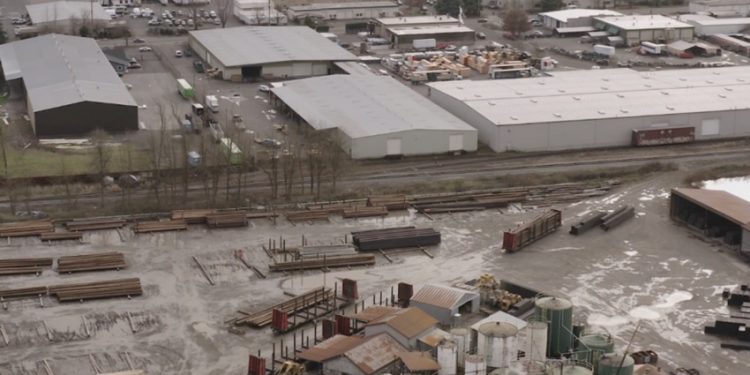Astoria, OR – Federal authorities have issued criminal charges against J.H. Baxter & Co. and its president, Georgia Baxter-Krause, for their operation of a wood-treatment plant in Eugene, Oregon. The charges stem from years of environmental violations at the facility, which was closed in January 2022 after nearly 80 years of operation.
The U.S. government’s legal filing, made public in late November, includes four charges: illegal treatment of hazardous waste, violation of the Clean Air Act, and two counts of false statements made to the Oregon Department of Environmental Quality (DEQ) by Baxter-Krause. These charges represent the culmination of years of regulatory scrutiny and community complaints about the company’s practices, which are alleged to have caused significant harm to both local health and the environment.
The most serious charge relates to the illegal treatment of hazardous waste. The federal government claims that J.H. Baxter discharged 1.7 million gallons of wastewater into the air over a period of nearly a year. This wastewater, which is said to have contained toxic chemicals, was evaporated using large industrial vats, known as retorts, that are typically used to soak wooden utility poles in creosote and other chemicals. The practice of evaporating hazardous waste into the air, the government argues, violates the Resource Conservation and Recovery Act (RCRA) and the Clean Air Act, both of which regulate the treatment and disposal of hazardous materials.
The company allegedly chose this method of evaporation to avoid the costs of replacing an evaporator or renting storage tanks, saving roughly $35,000 in the process. The federal complaint states that this practice occurred on 136 separate days between January 2019 and October 2019, far more frequently than the company had disclosed to the DEQ. J.H. Baxter, in its communications with state officials, had described the evaporation process as “seasonal,” claiming it was only done during heavy rains or when holding tanks were full. Investigators, however, contend that detailed process logs show this was not the case.
Along with the charge of illegal waste treatment, Baxter-Krause faces two counts of making false statements to the DEQ. One of these statements allegedly concerned the frequency of the wastewater evaporation, while another misrepresented the use of additional retorts in the evaporation process. Baxter-Krause had told the DEQ that only one retort, #81, was used for wastewater evaporation, but investigations revealed that other retorts (#82, #83, and #85) were also employed for this purpose.
The government argues that these false statements were made in an effort to downplay the scale of the violations and avoid regulatory scrutiny. Environmental groups and local residents have long claimed that the plant’s operations contributed to significant public health and environmental issues, with some alleging that the company’s leadership intentionally misled regulators to avoid enforcement.
The charges have sparked mixed reactions from local residents and environmental advocates. Many in the Bethel neighborhood of Eugene, where the J.H. Baxter plant was located, have long raised concerns about the plant’s impact on their health and the surrounding environment. Residents frequently complained about strong odors emanating from the facility, particularly at night, and raised alarms about potential health risks associated with exposure to toxic chemicals.
Lisa Dion, a local resident, expressed a mixture of anger and relief upon hearing of the charges. Her husband, Eric, grew up near the plant and was diagnosed with a rare form of cancer, which the couple believes was linked to exposure to pollutants from the plant. “It’s really infuriating to learn that people were knowingly breaking the law and jeopardizing the health of their neighbors,” Dion said. “But it’s also validating because it makes sense why so many people in this neighborhood are dealing with health issues.”
In addition to health problems, residents have experienced economic impacts, with property values reportedly dropping in areas near the plant. The ongoing contamination of local soil and water, including the removal of hazardous substances like dioxins, has left some residents questioning the safety of their homes and the future of their community.
The environmental damage caused by J.H. Baxter’s operations is not only a legal issue but a significant environmental crisis. The U.S. Environmental Protection Agency (EPA) is currently overseeing the dismantling of the plant’s 35-acre tank farm, which contains old metal containers, pipes, and around half a million gallons of toxic chemicals. The EPA expects the cleanup to take several more years, with a projected completion date of summer 2025.
In the meantime, Oregon Governor Tina Kotek has supported a proposal to designate the J.H. Baxter site as a Superfund site. Such a designation would provide federal funding for the site’s cleanup and rehabilitation, a crucial step in restoring the environment and safeguarding the health of nearby residents. The EPA is also currently addressing concerns about asbestos on the site, with air quality monitoring and asbestos abatement efforts beginning in December.
While the criminal charges represent a significant legal step, questions remain about the future of J.H. Baxter and its leadership. Despite being named in the charges, company president Georgia Baxter-Krause has been largely absent from the public eye. Her LinkedIn profile indicates she is located in San Mateo, California, but there are indications that she may have deactivated or abandoned her online presence. The company’s website also appears to be defunct, leaving local residents and environmental advocates wondering if Baxter-Krause is attempting to shield assets or evade accountability.
Environmental groups like Beyond Toxics have long called for criminal charges against J.H. Baxter, and Lisa Arkin, the group’s executive director, has expressed support for jail time for Baxter-Krause. “She was a bad actor during the entire time she led the company,” Arkin said, criticizing the company’s leadership for failing to address the problems they caused.
For residents of Bethel and other affected neighborhoods, the charges against J.H. Baxter and its leadership are just one step toward justice. While the legal process moves forward, many are focused on the long-term consequences of the contamination and the continued efforts to clean up the site. With the EPA’s cleanup efforts expected to last until 2025, and concerns about the potential for hidden assets, the fight for accountability and restitution is far from over.
For now, residents like Lisa Dion remain hopeful that the legal action will lead to real change and provide some measure of justice for the harm caused by J.H. Baxter’s operations. “It’s not fair to the neighbors of J.H. Baxter,” Dion said. “It’s been a long time coming, but I hope people will be held accountable.”













